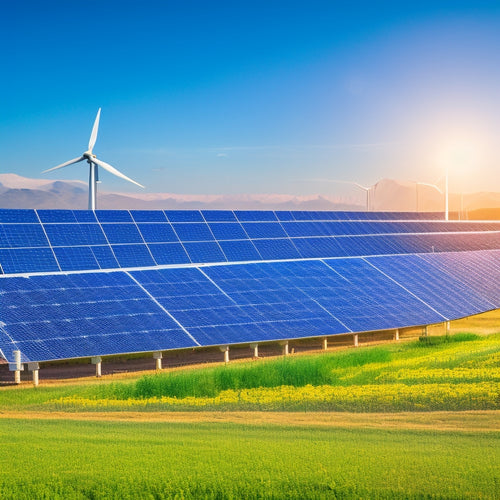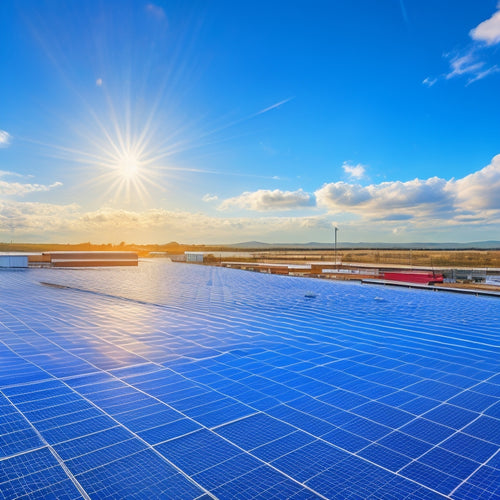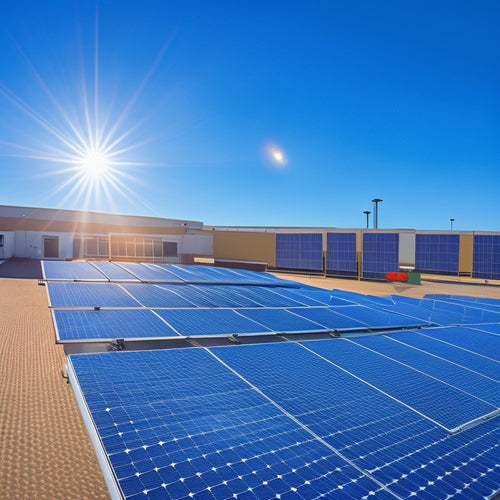
Boost Home Heating With Solar Power Systems
Share
By integrating a solar power system into your home heating setup, you can tap into a renewable energy source that can cover up to 70% of your heating needs, greatly reducing your reliance on fossil fuels and energy bills. You'll enjoy substantial cost savings, as nearly 50% of energy bills are attributed to home heating. Plus, solar heating systems enhance your property value and contribute to a cleaner environment with zero carbon emissions. With various system types and financial incentives available, you can find the ideal solution for your home - and uncover even more benefits as you investigate the world of solar-powered heating.
Key Takeaways
- Solar power systems can reduce home heating bills by nearly 50% and provide up to 70% of home heating needs.
- Solar heating systems utilize high-efficiency materials and fluid circulation to convert sunlight into heat for sustainable heating solutions.
- Incorporating solar heating systems can enhance property value and appeal to potential buyers in a growing market for eco-friendly homes.
- Financial incentives, such as government tax credits and rebates, are available to offset initial installation costs of solar power systems.
- Solar heating systems promote sustainability by offering a renewable energy source, reducing carbon emissions, and contributing to a cleaner environment.
Solar Power for Home Heating
Upon delving into the domain of renewable energy, you'll find that utilizing solar power for home heating is a viable and increasingly popular option.
Solar heating technologies offer an efficient way to reduce your reliance on traditional fossil fuels, resulting in significant energy savings. By capturing the sun's energy, you can heat your home, providing a comfortable living space while minimizing your carbon footprint.
With advancements in energy efficiency, solar power systems can now provide up to 70% of your home's heating needs. Additionally, incorporating Energy Efficient Smart Thermostats can further optimize energy usage and reduce peak energy consumption.
How Solar Thermal Systems Work
You'll find that solar thermal systems rely on solar collectors to absorb sunlight and convert it into heat energy.
These collectors, typically installed on your roof, contain a fluid that circulates through a network of tubes, allowing it to soak up the sun's radiation.
When designing an off-grid solar power system, it's crucial to take into account the battery bank design and overall energy requirements to guarantee a reliable and efficient system.
As the fluid heats up, it's pumped through a heat exchanger, where the heat is transferred to a separate fluid that's used to warm your home.
Solar Collector Function
In most solar thermal systems, the solar collector function is the heart of the operation, responsible for capturing the sun's energy to heat your home.
This vital component consists of a network of tubes and absorber plates, typically made from high-efficiency solar collector materials such as copper or aluminum.
When sunlight hits the collector, it heats a fluid flowing through the tubes, which then transfers the energy to your home's heating system.
The collector's efficiency depends on factors like surface area, material thermal conductivity, and the angle of incidence.
Optimizing these parameters guarantees maximum energy absorption, allowing you to capitalize on the sun's free energy and reduce your reliance on traditional heating sources.
Heat Transfer Process
Through a series of carefully engineered processes, solar thermal systems capture the sun's energy to warm your home. They do this by converting sunlight into heat through heat conduction.
In the solar collector, a fluid absorbs the sun's energy and carries it through a network of pipes to a heat exchanger. Here, the heat is transferred to a separate fluid, which circulates through your home's radiant heating system.
As this fluid flows through the pipes, it releases its heat, warming your home through radiant heating. This efficient process allows you to utilize the sun's energy to provide a comfortable and sustainable heat source.
Benefits of Solar Heating Systems
You'll reap several advantages by installing a solar heating system in your home.
To begin with, you'll see a significant reduction in your energy bills, as the system utilizes free energy from the sun to heat your home.
Additionally, you'll be contributing to a cleaner environment and increasing your property's value, which can be a huge selling point in the future.
Lower Energy Bills
By utilizing the power of solar energy, homeowners can greatly reduce their reliance on traditional heating sources, thereby slashing their energy bills.
You'll experience increased energy efficiency as solar power takes the load off your conventional heating system. This translates to significant savings on your energy bills, which can add up over time.
Additionally, you may be eligible for financial incentives from the government or utility companies, such as tax credits or rebates, for investing in a solar heating system.
These incentives can help offset the initial installation costs, making the shift to solar-powered heating even more appealing.
Environmental Benefits
As the world grapples with the challenges of climate change, solar heating systems emerge as a guiding light of hope, offering a cleaner, greener alternative to traditional heating methods. By utilizing renewable energy from the sun, you can greatly reduce your carbon footprint and contribute to a sustainable future.
| Benefits | Traditional Heating | Solar Heating |
|---|---|---|
| Carbon Emissions | High | Zero |
| Energy Source | Fossil Fuels | Renewable Energy |
| Environmental Impact | Negative | Positive |
Increased Property Value
With the installation of a solar heating system, your property value takes a significant leap forward. This upgrade not only enhances your home's energy efficiency but also increases its resale value.
A property appraisal will reflect the added value, making your home more attractive to potential buyers. As market demand for energy-efficient homes grows, your solar-powered home becomes a hot commodity.
Home upgrades like solar heating systems are a major selling point, sparking buyer interest and driving up resale value. As a result, you can expect a higher investment return on your solar heating system.
Furthermore, solar-powered homes tend to set neighborhood trends, additionally elevating your property's value and appeal.
Solar Water Heating Options
Solar water heating systems employ the sun's energy to warm water for your household use, offering a cost-effective and eco-friendly alternative to traditional heating methods.
By incorporating energy storage solutions, such as Deep Cycle batteries, you can optimize your solar power system's performance and reduce your reliance on fossil fuels renewable energy storage.
You can install a solar water heater to pre-heat your water, reducing the energy required by your conventional water heater. This hybrid system increases heating efficiency, saving you money on your energy bills.
There are two primary types of solar water heating systems: direct circulation systems and indirect circulation systems.
Direct circulation systems heat water directly in the solar collectors, while indirect circulation systems use a heat exchanger to transfer heat from the solar fluid to your household water.
Consider your climate, water usage, and local building codes when selecting the right solar water heating system for your home.
Space Heating With Solar Energy
Utilizing the sun's energy to warm your living space, you can greatly reduce your reliance on traditional heating systems and lower your energy bills.
By incorporating passive solar design principles into your home, you can maximize the sun's natural heating capabilities. This can be achieved through strategic window placement, insulation, and thermal mass materials.
- Incorporate large south-facing windows to capture direct sunlight
- Use thermal mass materials like concrete or brick to absorb and release heat
- Insulate your home to minimize heat loss
- Plant trees or install overhangs to block summer sun and reduce cooling needs
- Consider solar air heating systems for supplemental warmth
Cost Savings With Solar Heating
Nearly 50% of your energy bill goes towards heating your home, making it a prime area for cost savings. By installing a solar heating system, you can greatly reduce your energy costs.
You'll benefit from lower energy bills, and with the current incentive programs, you may be eligible for rebates and tax credits. Additionally, financing options are available to help you get started.
With solar heating, you'll not only reduce your energy expenses but also increase your home's value. As you consider the switch, keep in mind that the cost of solar panels has decreased over the years, making it a more affordable option for homeowners like you.
Installation and Maintenance Tips
With your solar heating system in place, proper installation and maintenance are essential to guaranteeing ideal performance and extending its lifespan.
You'll want to avoid common installation challenges that can lead to reduced efficiency or system failures. To get the most out of your investment, follow these maintenance guidelines:
- Regularly inspect and clean your solar panels to guarantee optimal energy absorption
- Check and replace air filters to prevent system overheating
- Perform routine system checks to identify and address potential issues early
- Schedule annual professional maintenance to guarantee system calibration and optimization
- Keep a record of maintenance and repairs to track system performance and identify areas for improvement
Frequently Asked Questions
Can I Use Solar Power to Heat My Pool?
You can definitely use solar power to heat your pool, opting for solar pool heaters that increase energy efficiency by utilizing the sun's energy to warm your pool water, reducing your reliance on traditional heating methods.
Are Solar Heating Systems Compatible With Radiators?
You've seen the success of solar-powered heating in homes like the 2019 Solar Decathlon winner, where solar energy fueled a radiator system with 95% efficiency. Yes, solar heating systems are compatible with radiators, offering optimized solar radiator compatibility and extraordinary solar heating efficiency.
Do Solar Panels Require a Lot of Roof Space?
You'll find that solar panels don't necessarily require a lot of roof space, as their efficiency depends on roof orientation and panel quality; a well-designed system can optimize energy output even with limited space.
Can I Install a Solar Heating System Myself?
You can attempt a DIY installation, but consider the risks: improper setup can compromise system efficiency. Without proficiency, you may void warranties, and safety concerns arise; it's recommended to hire a professional for a reliable and efficient solar heating system.
Are There Any Government Incentives for Solar Heating Systems?
You'll be pleased to know that, yes, there are government incentives for solar heating systems, including tax credits and financial rebates, which can greatly offset the upfront costs, making your investment more affordable and attractive.
Related Posts
-

The Role of Battery Monitoring Systems in Renewable Energy
Battery monitoring systems play an essential role in renewable energy by enhancing system longevity and optimizing pe...
-

Commercial Solar Energy
As you consider powering your business with commercial solar energy, you'll uncover it offers a triple benefit: signi...
-

Essential Solar Panel Mounts for Commercial Properties
When it comes to essential solar panel mounts for your commercial property, durability and wind resistance are key fa...


